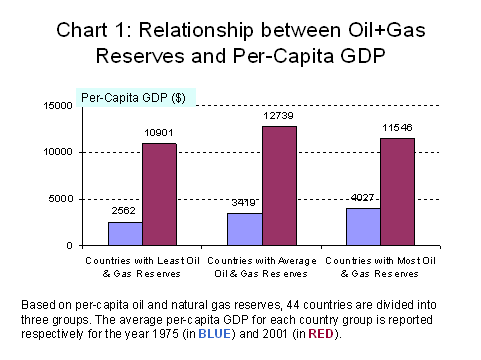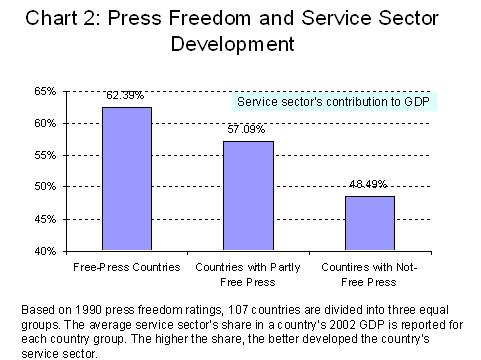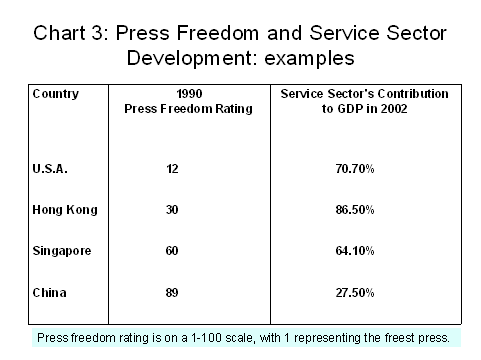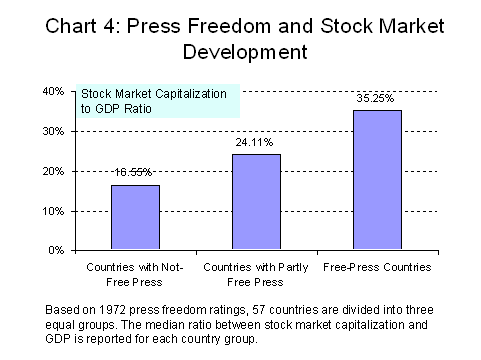(Reprinted from HKCER Letters, Vol. 74 May-Aug 2003)
Freedom of Information and
the Economic Future of Hong KongZhiwu Chen
¡@
It would be an understatement to say that the pending legislation on Article 23 is of critical importance to the future of Hong Kong. Many commentators have discussed the political and social implications of this legislation in and outside Hong Kong. In this article, I will focus on the dollars-and-cents questions: how will this legislation affect the economic future of Hong Kong? Why is the freedom of information and of the press so important to the economic livelihood of Hong Kong?
To answer these questions, we want to first ask ourselves: what is the best asset that Hong Kong has? ¡X Here, I am asking this question in terms of three broad types of assets: natural resources, the population, and the institutions (political, legal and economic). For Hong Kong, we can clearly rule out natural resources. Unlike Russia, Middle Eastern countries, mainland China or even Indonesia, Hong Kong cannot compete, or try to live, on natural resources. Usable land space is also very limited. Most of us may think that the numerous skyscrapers on the territory constitute the best asset of Hong Kong. But, the 60+% decline in real estate value over recent years only serves to remind us that this part of Hong Kong's wealth is as fragile as natural resources do not exist in Hong Kong.
Relative to the limited land, Hong Kong has a "large" and educated population. Of course, with a large population but no natural resources, there are two ways to grow the economy. First, as did from the 1950's to the 70's, Hong Kong can try to rebuild its manufacturing sectors. However, given the dramatic difference in labor and real estate costs between Hong Kong and the mainland, this direction is not going to work and this road is a dead-end. The other way to rely on the labor force for growth is to further develop the service sectors. Here, keep in mind that Hong Kong's dense and large population could not really be its competitive advantage because across the border the mainland has many more people, and also because not far away there are again more people in India and Indonesia. Thus, the population per se cannot be Hong Kong's best asset.
We are then left with institutional capital: Hong Kong's institutional infrastructure centered on the rule of law, press freedom and an economically non-interventionist government. In particular, freedom of the press has been at the heart of its political, legal and economic infrastructure. These intangible institutions and traditions are the best asset of Hong Kong, and they hold the best hope for future prosperity in the Special Administrative Region (SAR).
Institutional capital as the best assetAccording to the traditional view, a nation's wealth comprises only its measurable physical assets (physical capital), with its land and other natural resources as the dominating determinant. Thus, resource-poor nations were destined to be poor.
But, some time after World War II, things started to change as countries and territories such as Hong Kong and Singapore that were endowed with little or no natural resources grew faster than resource-rich countries. For example, from 1980 to 1997, Hong Kong's GDP grew at 6.5% annually. Similar growth was experienced by Singapore, South Korea and Taiwan. By 2002, per-capita GDP was US$26,760 in Hong Kong, US$31,405 in Singapore, and US$23,420 in Taiwan. In contrast, since 1965, oil-rich countries such as Saudi Arabia and Iran have seen its real per capita GDP decline by more than 2% a year.
To understand whether the above growth/decline stories are just aberrations or reflect a fundamental change in what constitutes "national wealth", we can look at the correlation between per-capita GDP and per-capita oil-plus-natural-gas reserves of each country. Here, we use the dollar value of oil and natural gas reserves to proxy for a country's natural resource endowments (note: adding precious metals and other mineral reserves to the proxy does not change our overall conclusion). Since data for years prior to 1975 are only available for a limited number of countries, I use the macroeconomic data for 85 countries starting in 1975. It is understood that probably as early as right after World War II, the importance of natural resources in national wealth started to decline. In other words, the correlation between resource endowment and GDP must have been quite high prior to World War II. However, even in 1975, the correlation between per-capita GDP and per-capita oil plus gas reserves was 42%, implying the higher the resource endowment, the higher the per-capita GDP and hence richer. If I divide the countries with oil and/or gas reserves into three equal-size groups, then the average per-capita GDP in 1975 was US$4027 for oil-and-gas-rich countries, US$3419 for the middle group, and US$2562 for resource-poor countries (see Chart 1). Thus, the traditional view of national wealth was still supported by the cross-country experience back then.
However, by 2001, the correlation between per-capita GDP and oil plus natural gas reserves was down to 6%. Statistically, there is no longer a significant correlation between national income and resource endowment. As shown in Chart 1, in 2001, the average per-capita GDP was US$11,546 for oil-and-gas-rich countries, US$12,739 for the middle group, and US$10,901 for resource-poor countries (Chart 1). Of course, if the recent trend continues, in several years the per-capita GDP based ordering of the countries will be reversed.The post-World War II experience in the U.S., Hong Kong, Japan and many other countries has presented a fundamental challenge to the traditional view of what constitutes "national wealth." It is no longer a nation's physical capital that determines its edge in global wealth competition. Rather, it is the intangible institutional capital that determines the economic standing of a country or region. What does this new reality mean for Hong Kong's future?
The nature of Hong Kong's economyConventionally, each economy is divided into four broad sectors: agricultural, mining, manufacturing, and services. Both the agricultural and mining sectors are dependent on natural resource endowments. In the year 2002, the agricultural sector's contribution to Hong Kong's GDP was less than 0.1%, while the mining and manufacturing sectors' total share was 13.5%. Understandably, as the mainland started to open in the early 1980's and as manufacturing jobs continued to migrate toward the mainland, the manufacturing sector's share in Hong Kong's GDP came down from 23.6% in 1980 to slightly above 5% last year, whereas the service sector's share went up from 67.3% in 1980 to 86.4% last year. Since Hong Kong cannot compete in the agricultural, mining or manufacturing sectors with the mainland or other countries in East Asia, future economic growth will have to come from the service sector, including financial services, health care and educational services.
What institutional infrastructure is necessary for the service sector to grow in Hong Kong? The answer lies in the rule of law and freedom of information. To understand this, let's compare manufacturing and financial transactions. In auto manufacturing, for example, what you make and trade is a tangible car. A car buyer can look at the design style and colors, can open the trunk and even the engine to inspect the quality, and can do one or more test-drives. The informational asymmetry between the manufacturer and the buyer is very limited. And the buyer may never need to open the informational brochures provided by the seller, because inspecting and test-driving may be sufficient for the buyer: "what you see is what you get." Of course, legal enforcement of product liability would be desirable. But, in the absence of reliable legal recourse, many car buyers may be able to overcome legal deficiencies by inspecting and testing the cars "harder".
The informational advantage that comes with a tangible product explains why even countries with no rule of law and no free press can still grow their economies by engaging in manufacturing tangible goods. The Asian Tigers (except Hong Kong and Singapore) in the 1970's and 80's and China today are outstanding examples.
In contrast, what is traded in a securities transaction (say, a stock) is a financial contract written on a piece of paper or recorded electronically. First, what is sold in a stock trade is a claim on a future cashflow stream. This claim will be worth nothing if it is not backed by an investor-friendly securities law and an independent, effective judiciary. A title to a future cashflow is worth something only if the buyer is confident that throughout the life time of the claim, reliable and independent legal recourse is available whenever needed. Second, precisely because of the intangible nature of a financial security, a stock buyer is at a severe informational disadvantage: the financial contract being traded has no color, no style, no weight and no flavor; neither can the buyer test-drive it. The buyer has to rely on the information disclosed by the seller, in order to make a judgment on the value of the security. If he is lucky and the transaction takes place in a market economy where the flow of information is free and uninhibited, he can then also rely on the independent and possibly unbiased information provided by the press and other third-party sources.
Health care and educational services require a supportive institutional infrastructure as well. In health care, what a patient is paying for is a service provided by a doctor/nurse, where the patient usually has no expertise to evaluate the quality and the quantity of the service he is getting. In education, the quality of the service is even more difficult for the paying customer (and his parents) to determine. All of these markets represent situations where the transacting parties face severe informational asymmetry. The free and uninhibited flow of information is the only way to reduce the level of informational disadvantage faced by the customers.
Therefore, unlike mining and manufacturing, the health and growth of the service sector depends critically on the free flow of information and the rule of law. How much confidence can we have in this statement? ¡X Since the rule of law and press freedom are highly correlated for each country, the remainder of this article will focus on the relationship between press freedom and economic development. In particular, we use the 1990 press freedom ratings of 106 countries by Freedom House as a proxy for the uninhibitedness of information flow in a country (http://www.freedomhouse.org/ratings/). Then, if we treat the service sector's share in a country's GDP as measuring the degree of development of the country's service sector, we find a country's press freedom and its service sector's development to be highly correlated: the correlation between press freedom rating in 1990 and the service sector's share in GDP in 2002 to be
61.5%!
We can also divide the 106 countries into three equal-size groups according to their 1990 press freedom ratings: free-press countries, countries with middle press freedom ratings, and countries with the lowest press freedom ratings. Then, the average service sector's share in GDP in 2002 is 62.4% for free-press countries, 57.1% for countries with average press freedom, and 48.5% for countries with the least free press (see Chart 2). Freedom of the press indeed facilitates the service sector's development.To make more sense of the statistics, note that the press freedom rating in 1990 is 12 for the U.S. (the ratings are on a 1-100 scale, with 1 representing the most free press and 100 the most restrictive informational environment), 30 for Hong Kong (ranked 47th most free out of 106 countries), 60 for Singapore, and 89 for China (ranked 105th). On the other hand, the service sector's share in GDP is 70.7% for the U.S., 86.5% for Hong Kong, 64.1% for Singapore, and 27.5% for China. Chart 3 lists these statistics.
¡@
What is surprising out of Chart 3 may not be the clear and strong correlation between press freedom and service sector development, but rather the fact that the service sector's share in Singapore is actually lower than in the U.S. Singapore has long followed this known policy of "free economic press but restricted political press," based on the assumption that economics and politics can be separated. Given the overall economic progress in Singapore, one would think that this "selectively free press" policy has worked well. Given the lack of natural resources and land space in Singapore, one would also have expected Singapore's dependence on the service sector to be much higher than the U.S. (after all, the U.S. is endowed with rich natural resources and has built a vast manufacturing base). But, the reality is that Singapore's service sector is not as well developed as in the U.S.! This means that Singapore's service sector's growth potential is still very high (especially compared to Hong Kong's). But, perhaps Singapore needs to first relax its press and informational environment?The Singapore experience suggests that it is hard to separate the political press from the economic press. First, economic corruption is often linked to political corruption, which makes the borderline between political and economic speech difficult to define at best. Second, if and when, say, a pivotal bank is about to collapse and its collapsing will take the country's economy with it, will the information concerning the financial health of the bank be considered "state secrets"? What if an investigative story concerns the financial conditions of a corporation of national strategic importance? Thus, once the definition of "state secrets" is loose and open-ended, even economic information cannot flow freely. Third, the issue of critical importance may not be whether you allow the economic press to be free and the political press to be restricted, but the overall informational environment that such a selectively free press will create. It ruins the confidence that market participants will have in the quality and reliability of information.
Given the strong correlation between press freedom and service sector development, our next question is: does free flow of information cause the service sector to develop better, or does the service sector's development leads to a more free press? ¡X Of course, in the context of Hong Kong, even if there is no causality between the two and even if it is just a coincidence that countries with a well-developed service sector exhibits a free press, then shouldn't Hong Kong keep its traditionally free environment so as to stay as a qualified member in the international economic elite?
Information freedom as a necessary institution for financial marketsThe development story of Hong Kong is remarkable in every sense. With a market capitalization of US$463 billion, its stock market is the 10th largest world-wide and the second largest in Asia. With a total of US$311 billion in assets under management in 2001, Hong Kong's fund management industry is ranked 7th globally and again the second largest in Asia (after Japan). Hong Kong has been the key financial center in Asia outside Japan.
Even with these achievements, there is still more room for Hong Kong to develop its financial service industry and hence grow its economy further. For example, at the end of 2002, there were a total of 978 stocks listed on the main board and GEM. Among these stocks, 66 companies are from the mainland and only 10 firms from foreign countries. These non-Hong Kong stocks together make up slightly less than 8% of the listing total. In comparison, the Zurich Stock Exchange has 54% of its listed stocks from foreign countries, the Amsterdam Exchange has 51% from foreign countries, London has 39% from non-British firms, and Paris has 37% of its listed stocks from other countries. Therefore, compared to these European financial centers, Hong Kong is "too domestic" and not international enough.
Will Hong Kong lose to Shanghai in the competition for the "largest financial center in Asia" position? How can Hong Kong become a more international financial center? The answer is clear: if Hong Kong moves away from its free market-friendly institutional infrastructure as China struggles hard to move toward it, Hong Kong will for sure lose.
To win in this process, Hong Kong must further promote the free flow of information (instead of making it more restricted) and develop a more investor-friendly securities law. To appreciate this point, we can consider an example. For simplicity, suppose that Mr. Lee can invest his financial wealth among three securities: a bank savings account, stock ABC and stock XYZ. According to the public documents issued by ABC and XYZ, both companies claim that they have a bright future in growth and earnings, and that their goal is to maximize shareholder value. Assume that in reality, one of the two firms is actually planning to steal all the money away as soon as they have raised the capital. In this case, no matter how tough the securities law may be in inducing truthful disclosure by corporations, independent and uninhibited investigating reporting by the media is necessary so that the investing public can be better informed about which one of the two firms is actually running a scam business. How uninhibited the information institutions are in this context will determine how efficient the stock market will be in rewarding "good" firms and punishing "bad" firms.
To make our argument more to the point, assume that the chairman of each of ABC and XYZ is politically well-connected and powerful, so the un-protected media don't dare investigate the two firms. As a result, investors are left in the dark: they cannot distinguish between ABC and XYZ. There are many consequences of such an informationally opaque market:
• Mr. Lee and other investors may decide to stay out of the stock market, leading to a lack of participation and low liquidity (low trading activities). Liquidity is the livelihood of a financial market and determines the ultimate fate of the market. As a quick comparison, stock-market participation rate is 49.5% in the U.S. (half of U.S. households hold stocks), about 20% in Hong Kong, and less than 5% in China (based on various statistics). These statistics suggest much room for Hong Kong to improve the free flow of information and hence expand the stock market further.
• Even if Mr. Lee and some other investors decide to invest a fraction of their wealth in the stocks, in the presence of total informational opacity they will invest an equal fraction in both ABC and XYZ, in order to hedge against the informational uncertainty. When the stocks cannot be distinguished, each stock will be valued the same by investors, which may explain why in Hong Kong a stock is usually split into more shares as soon as the share price exceeds several dozens of cents (racing to zero stock price). In addition, when investors can only buy or sell all the stocks indiscriminatively and at the same time, stock prices tend to move in the same direction: either all go up or all go down, a phenomenon common among emerging markets and largely true in Hong Kong as well.
Of course, when investors have difficulty distinguishing among "good" and "bad" stocks, their indiscriminative buy-and-sell decisions will only serve to punish "good" companies and reward "bad" companies, making the market represent the wrong corrective mechanism. Once stock-issuing firms see this and take it into account in their corporate financing decisions, the "good" companies will likely decide to withdraw from the stock market while the "bad" ones will stay. After "good" firms withdraw and go private, more investors will shun away from the market as well, making stock prices go down, which in turn causes even the second-best firms to withdraw, and so on. Such an adverse-selection process will continue until either the market becomes transparent through the freedom of information and through enforcement of disclosure laws, or the market is shut down.
We can also look at the cross-country experience in financial market development to confirm the importance of free information flow. This time, according to their 1972 press-freedom ratings, we divide 57 countries with stock markets into three equal groups. Then, for each group of countries, we compute the median ratio between a country's stock market capitalization and its GDP as of 1995. The market capitalization to GDP ratio serves to measure the developedness of a stock market. Chart 4 plots the result, showing that the free-press countries have the most developed stock markets (with a median ratio of 35.25%), while the not-free-press countries have the least developed markets (16.55%).
Hong Kong's economic futureWhile Hong Kong is debating on the pending legislation on Article 23, it is important to keep the right perspective on what has brought Hong Kong to where it is today and what is its best asset going forward. Today, Hong Kong derives more than 86% of its GDP from the service sector. As China builds more manufacturing power for the world, the service sector is becoming even more of Hong Kong's future. Given our discussions above and the evidence reviewed, it should be clear that the SAR's economic future lies in its institutional capital.
To put it differently, didn't countries like Russia, Poland and even China wish to have Hong Kong's institutional infrastructure in place back in the 1980's and perhaps even today? These countries had to choose between "first political reform and then economic reform", and "first economic reform and then political reform", with the ultimate goal of developing something close to Hong Kong's infrastructure. Reformers in these countries realized that either reform sequence taken would mean a major disruption and pain for their society, not to mention the tremendous amount of risks and social costs. After the "shock therapy" in the early 1990's, today's Russia has come a long way and still has some distance to go. And it is still unclear as to how mainland China will be able to reform the political and legal institutions to reach where Hong Kong is today. Then, why give away something that others have tried so hard to achieve?
Zhiwu Chen is Professor of Finance, Yale University. This paper was presented at the conference on Freedom and National Security - Has the Right Balance Been Struck?, jointly organized by The Hong Kong Bar Association, Faculty of Law at The University Hong Kong, Centre for Comparative and Public Law at The University of Hong Kong, and School of Law at The City University of Hong Kong, 24-25 June 2003, Hong Kong.
¡@
| Index | Research Projects | HKCER Letters |
| Speaker Program / Conference | Index of Economic Freedom |
The Hong Kong Centre for Economic Research
School of Economics and Finance
The University of Hong Kong
Phone: (852) 2547-8313 Fax: (852) 2548-6319
email: hkcer@econ.hku.hk



